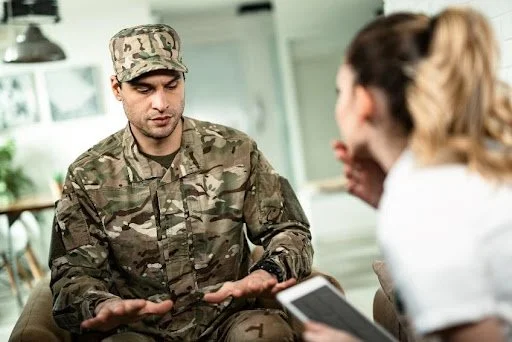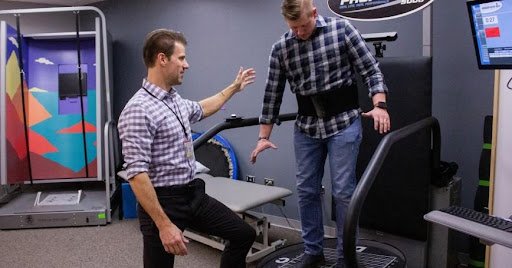Normalize Helping Veterans With PTSD
By Brianna Rodewald
Post-traumatic stress disorder (PTSD) and depression are very common in Veterans and a topic that should be discussed more. Getting the help that they deserve for the amount of violence they experience when overseas is crucial for their mental health. “Many older Veterans find they have PTSD symptoms even 50 or more years after their wartime experience,” (Cook, 2001). My uncle was 55 years old, and he was affected by PTSD. He did not believe in therapy which played a role in him not getting the right help. Many veterans are afraid to get help because it makes them look “weak.”
This is a major misconception. PTSD is not a sign of weakness. So I believe it will disappear eventually. However, PTSD can last your whole life. There is no duration in which it will stop, nightmares or flashbacks. We will never understand what exactly goes on in their mind because we do not live the same lives as they had, but empathizing with them and wanting to understand them can be extremely beneficial.
PTSD can play a role biologically, psychologically, and behaviorally. This can result in reduced quality of life and severe functional impairment. PTSD is different for everyone and how it affects them and their daily lives. My uncle was affected, not every day but every once in a while. He would have nightmares or panic attacks, flashbacks, anything you could imagine. I believe that Veterans deserve to get all the help that they may need, sometimes I think they do not know all of the resources available to them. Knowing and understanding treatments are important steps in getting help.
Depression is a very common disorder in Veterans. Depression can mean a lot of different things. Some Veterans could experience depression due to the loss of a friend while in combat, seeing horrific scenes, or going through their own experience while on duty. Here are some of the symptoms that may be present in someone experiencing depression.
Signs or symptoms:
Feeling sad or hopeless
Feeling unworthy
Stress
Anxiety
Treatments for PTSD with veterans include:
Antidepressants such as Sertraline and paroxetine help treat PTSD. This helps increase serotonin levels in the brain which can help improve symptoms associated with PTSD (Lawson, 2014).
Psychotherapy is another form of treatment that can help Veterans with PTSD. Such as trauma-focused cognitive behavior therapy. CBT involves identifying and challenging dysfunctional beliefs and correcting them to help with the symptoms of PTSD among veterans (Lawson, 2014).
Exposure-based therapy helps with confronting their fears face-on and exposing them to the traumatic stimuli and their past experiences to help overcome their fears and feelings (Lawson, 2014).
Stress management therapy is useful in the form of PTSD- related anxiety. Stress inoculation training (STI) teaches coping skills such as breathing, relaxation, and positive thinking to decrease stress (Lawson, 2014).
Group-based therapy is helping out one another, hearing other Veterans' stories, and understanding what they went through. No one can understand what they go through but hearing other people’s stories may help get theirs out there (Lawson, 2014).
Mindfulness-based cognitive therapy (MBCT) can help recognize early signs and symptoms of PTSD. This can help turn away from negative thoughts and patterns. Recognizing these behaviors can help them catch themselves when they are going back into traumatic experiences (Lawson, 2014).
Interpersonal psychotherapy depression (IPT) focuses on interpersonally relevant issues. The main goal is to reduce depressive symptoms and improve social functioning. This is the recommended treatment for military service members and veterans with depression. The protocol for this treatment is 16 weekly individual sessions across three treatment phases: Initial, Intermediate, and termination (Stewart, 2014).
Cognitive behavioral therapy is a form of talk therapy that helps turn negative thought patterns to help improve their overall health (Stewart, 2014).
Researchers at an organization formed to connect military planning with research and development decisions (RAND) aim to redefine high-quality care for veterans with PTSD, (Irving, 2021). This organization wants to help all Veterans get back to what they used to know as normal and thrive when coming back from combat.
Veterans go through a lot in their lives, they witness things civilians do not, and they go through experiences that civilians will never understand. Getting the help that they need when they come home is very important. It is crucial to help them cope when coming back from war and help them adjust to the life they once knew.
References
American Psychological Association. (n.d.). Apa PsycNet. American Psychological Association. Retrieved March 15, 2023, from https://psycnet.apa.org/search/display?id=08897d10-2200-c86f-9af2-d4faf6df192e&recordId=1&tab=PA&page=1&display=25&sort=PublicationYearMSSort+desc%2CAuthorSort+asc&sr=1
Irving, Doug. “Advances in Care for Veterans with Traumatic Brain Injuries or PTSD.” 8 Nov. 2021, https://www.rand.org/blog/rand-review/2021/11/advances-in-care-for-veterans-with-tbi-or-ptsd.html.
Nicole R. Lawson practices emergency and inpatient medicine at Callaway Community Hospital in Fulton. (n.d.). Posttraumatic stress disorder in combat veterans: Jaapa. LWW. Retrieved March 15, 2023, from https://journals.lww.com/jaapa/Fulltext/2014/05000/Posttraumatic_stress_disorder_in_combat_veterans.4.aspx
“Va.gov: Veterans Affairs.” Posttraumatic Stress Symptoms among Older Adults: A Review, 23 Jan. 2013, https://www.ptsd.va.gov/professional/treat/specific/symptoms_older_adults.asp.

